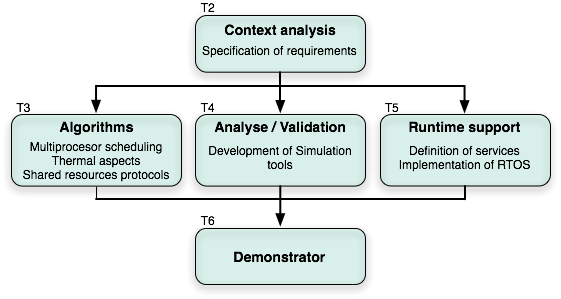Presentation
Abstract
The RESPECTED project addresses the issue of implementation of real-time systems on multi-core architectures. It lies in the field of real-time embedded systems with hard constraints. The intended application domain is automotive embedded computers. This area is critical because of the many constraints it brings such as AUTOSAR standard, operating conditions, reliability of circuits... The advent of multicore architectures in components such as microcontrollers offer new perspectives: significant increase processing power and obvious economic interest as it opens the way for reducing the number of embedded computers. However, it also brings many scientific problems.
The project proposes to conduct a series of works covering the theory of real-time multiprocessor scheduling to the operating system that implements such real-time algorithms. Schematically we propose:
- Selection and adaptation of scheduling algorithms following the partitioned and global approaches with efficiency as the primary criterion for implementation ;
- From the fundamental algorithms, taking into account new requirements such as thermal control aspects of the processors (control cycles of heating for this not degrade the reliability of components) and efficient sharing of resources in multicore environment (using transactional memory mechanisms to avoid the low efficiency of spin-locks) ;- Implementation of simulators for the analysis of algorithm performance and the validation of applications using them ;
- Support the realization of real-time operating system taking into account these algorithms as well as all services related to the management of multi-core architectures.
The resulting software products (simulators, real-time operating system) will be extensions of already existing products and made available to the community as free software by partners.
Objectives
Concerning the fundamental real-time scheduling, the RESPETED project aims to produce results for both partitioning and global scheduling approaches. Comprehensive efforts have yet to be conduct to confront them with reality and to bring the models and implementation. It is the goal of the RESPECTED project. We not oppose partitioning and global scheduling or not to favor the outset one of the two, but we work in both areas. The current specifications for multi-core systems in the automotive field extends mono-core version and tend to partitioning. However symmetrical multi-core architectures are ideal targets for global scheduling. Our intention is to explore the integration of algorithms in a multiprocessor runtime support, and the effectiveness in terms of additional costs incurred time.
The project also aims to consider a new problem: the thermal cycles of processors that can significantly reduce system reliability. This problem is approached through scheduling. The main scientific obstacle is the evaluation of the temperatures of cores. It depends on the scheduling algorithm, the temporal behavior and energy of the configuration, and the model of heat dissipation of the energy consumed. We will also face problems of measurement techniques to validate models.
Finally, the problem of resource sharing in the automotive context is currently set to single-core by using protocols such as IPCP. Current proposals for the standatd AUTOSAR core architecture based on the use of spin-locks. Our goal is to adapt and evaluate existing multiprocessor scheduling algorithms for data sharing based transactional memory. We will pay particular attention to the time efficiency of new algorithms based on transactional memory. If it is not possible to produce efficient algorithms in the context of this paradigm, the objective of this work will be to explore new solutions for resource sharing algorithms.
For simulators and runtime support, our goals are the extension and adaptation of open source software already developed by a partner. A functional simulator (STORM) to real-time tasks for a multiprocessor architecture is already available and a hardware simulator (Harmless) capable of operating in either instruction set simulator or cycle-accurate simulator. The new contributions mainly concern the efficient modeling of the behavior of caches and thermal behavior of processors. To support implementation, we use the RTOS Trampoline as a base to migrate to support multicore architectures.
Project structure
The scientific program of work is organized around three major tasks relating to:
- The study of efficient implementation of multiprocessor scheduling algorithms.
- The study of simulators, which are essential for performance analysis of algorithms on various aspects (temporal and thermal).
- The realization of multi-core real-time operating system implements algorithms selected.
These three tasks are completed by an initial task of specifying requirements related to the context, both the hardware and software, as well as a task of producing a demonstrator using all the results produced.

Expected scientific and technological impact
The scientific benefits include:
1- Efficient implementations of real-time scheduling algorithms for multiprocessor architectures with partitioned and global approaches.
2- Control processor thermal aspects to increase system reliability.
3- Effective management in the context of multi-core sharing of data.
The technical benefits are the provision for the community in the form of free software and a set of tools contributing to the development of real time.
Economic and industrial impacts
The economic impacts are the appropriation of new knowledge by the industrial partner See4sys which is very invested in operating system implementations and demonstrator on a real problem.
See4sys being "premium member" AUTOSAR, it may bring the project's progress at the level of standardization.



